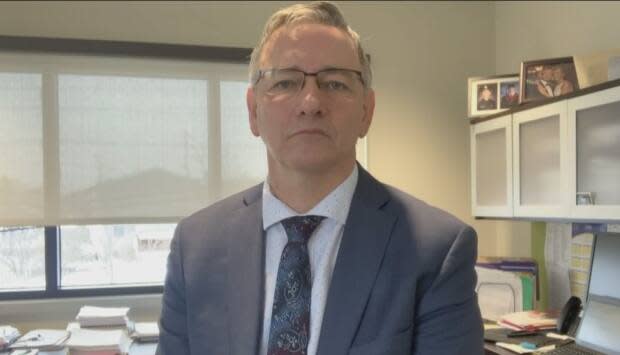Unions 'optimistic and hopeful' new health care scheduling would use patient acuity model

Union leaders say they're cautiously optimistic that a contract with a U.S.-based company hired to create scheduling software that is also meant to find savings in Newfoundland and Labrador's four regional health authorities will mean changes to a health care system where staff are overworked, burnt out and exhausted.
Jerry Earle, the president of the Newfoundland and Labrador Association of Public and Private Employees (NAPE), says he and other union leaders met with the health authorities in October 2020 to discuss the contract with Change Healthcare Canada.
In that full-day briefing, Earle said the emphasis was put on addressing issues NAPE has been pushing to get addressed for years: "staffing shortages, excessive overtime, inability to provide appropriate patient care, sickness and injury at just unacceptable levels," Earle said.
"Everything that we heard in the briefings was talked about addressing those concerns … So we were pleased that they were going to be addressed," Earle said.
The contract comes with a lucrative incentive for the company: the more savings Change Healthcare helps find, the more money it makes, up to $35 million over the course of the deal.
That's a less than ideal motivation, said Earle.
When you're working a 20-hour shift, something's getting missed. - Yvette Coffey
"We got to get away from that. Our front-line members don't get additional incentives for going above and beyond, and they find that offensive and I find that offensive," he said.
However, Earle said the focus needs to be on improving quality of work life for his members, while also ensuring patient care.
"Our members cannot get a day off … they don't want to be working this exorbitant overtime, they are being physically and mentally injured and they are not providing care that the residents and patients require when they're mentally and physically exhausted," Earle said.
"They cannot keep up the pace that they're at, so the savings that was talked about to us was, can they save overtime and reinvest that money into front-line workers. I've always got a problem with incentive-type [deals] … but that's not new."

Workers at long-term care homes, in particular, are at the "brink of exhaustion," or well past it, Earle said, and the goal of the contract is, as far as he knows, to put an end to employee burn out.
"They can't keep up doing the overtime they're doing, they can't keep up with the excessive hours, they can't get a day off. So these mechanisms are supposed to deal with that, from what we were briefed on," Earle said.
"It's clear we are understaffed, and the staff are burnt out and exhausted, and mechanisms have to be put in place, so that's what was relayed to us in a very positive way: that they were looking at trying to address what unions, NAPE included, have been bringing to them."
'We need to change something'
Improving staffing levels and patient care is the emphasis for the Registered Nurses' Union, said president Yvette Coffey.
"Our registered nurses and nurse practitioners are exhausted, they're mentally exhausted and they're physically exhausted. We have registered nurses doing 56 hours of overtime in a two-week pay period, on top of their regular hours. We have registered nurses working between 16 and 20 hours a shift," Coffey said.
"When we're tired, when you're working a 20-hour shift, something's getting missed. This is affecting patient care and we need to change something."
There are even cases, she said, of nurses unable to leave at the end of their shift because no one came in to relieve them. Each year, registered nurses are clocking in 275,000 hours of overtime, Coffey said.
The nurses' union did not endorse the contract signed with Change Healthcare Canada, Coffey said, adding that she's still trying to get more information from the company.

Coffey said a new scheduling model would ideally look at acuity of care of patients, meaning staffing would be scheduled to care for patients and their specific needs, rather than just based on the number of beds, as it's run now.
"Acuity-based staffing means we can increase the complement of registered nurses and health-care professionals based on the actual patient and not a bed," Coffey said, adding that to her knowledge, there are no other provinces in Canada that schedule based on patient acuity.
"I think this is an awesome opportunity for registered nurses and nurse practitioners and for patients in the country, and especially in the province of Newfoundland and Labrador. If we can get staffing right, we can improve the health outcomes for the people of Newfoundland and Labrador."
Both Earle and Coffey said in an ideal situation, expertise would be found within the province, ensuring those in charge of creating a system for Newfoundland and Labrador's unique situation understand the province's geography, demographic and challenges.
However, neither of the union leaders knew of any company locally to address the situation in a timely fashion; Earle said he hopes to see something within six to 12 months.
"We will monitor this contract extremely closely to make sure what was relayed to us and other unions is true and effective," Earle said. "If not, they will hear from us."
Coffey, meanwhile, said she has concerns about a private company being brought in to make changes to a public health care system, but she hopes whatever the next steps are, they focus on making lives for employees and patients better.
"We are very optimistic and hopeful, and Dr. Haggie, I will hold you to your comments that this is going to decrease workload and increase staffing for our members," Coffey said.
"We all know that if we increase staffing — the core staffing — if we staff hospitals and communities and long-term care facilities based on the patient in the bed ... that we will have better outcomes for health care of Newfoundlanders and Labradorians."

